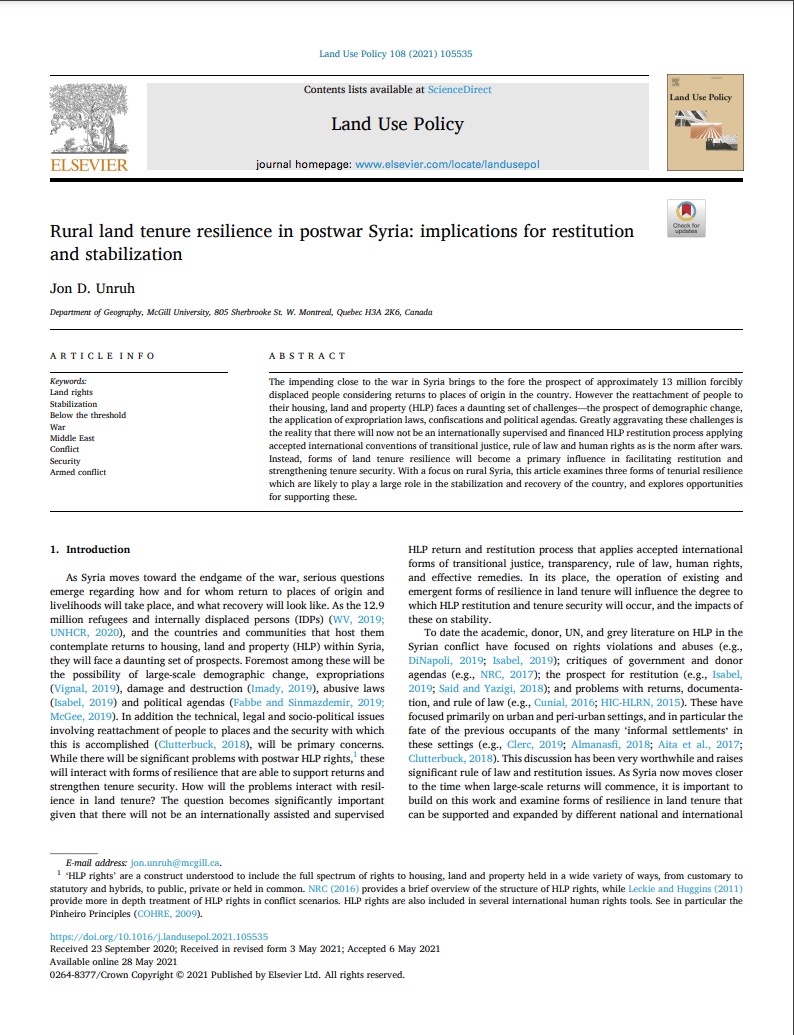Jon Unruh, PhD. is a professor in the Department of Geography at McGill University in
Montreal. He has over 25 years experience in developing and implementing research,
policy and practice on war-affected land and property rights in the Middle East, Latin
America, Africa, and Asia, and has published widely on these topics. His specialty is
housing, land and property (HLP) restitution claims in war-affected scenarios. Most
recently he has assisted the UN in a mass claims HLP restitution project in Yemen; and he is
currently working on an approach for mass HLP restitution claims for Ukraine. Dr. Unruh has also conducted research and policy work regarding HLP in, Syria, Sudan, Liberia, Somalia, Mozambique, East Timor, Sierra Leone, Ethiopia, Uganda, Zambia, Malawi, Madagascar, Cambodia, Angola, Cameroon, Jordan, Colombia, Peru, Zanzibar, Kenya and Saudi Arabia, and remotely on Syria, Iraq and Afghanistan. He has worked with the UN, The World Bank, USAID, DFID, and other multilateral and bilateral donors and NGOs.
Interests: Postwar land tenure
Details
Location
Contributions
Displaying 1 - 10 of 12Housing, land and property restitution after wars takes decades: Ukraine can change this
Ukraine is poised to transform the process of housing, land and property (HLP)
restitution and compensation after wars. The Russian invasion of Ukraine has displaced
more than 13.5 million people (UNHCR 2023) and created massive destruction and
damage to the country’s HLP. Initial efforts at recovery along with counter-offensives
have stabilized large areas of the country and liberated others, to which displaced
Ukrainians are now beginning to return (Duggar 2022; Conkling 2022). The Ukrainian
Ukraine’s tenurial tangle: Housing, land and property restitution in the Russian war
The severity of the population dislocation and destruction of housing, land and property (HLP) in the Ukraine war has driven efforts for starting reconstruction planning prior to the war's end. This comes with the realization that re-covery will entail considerable preparation, including ef-forts at using seized Russian assets to finance it. Engaging in HLP restitution and compensation will be a primary re-covery challenge, with the Ukrainian government moving forward with legislation for facilitating this.
Reconstruction and Restitution: A Fundamental Stabilization Issue with Ukraine as Case Study
With over 14 million people now displaced from their housing, land, and property (HLP) in Ukraine there is considerable concern about the reconstruction and restitution process. This is particularly significant in Ukraine given that destruction of HLP appears a purposeful effort on the part of Russian forces. The Ukrainian Prime Minister emphasized the importance of reconstruction and restitution planning before the war is over.
Deriving countermeasures to the use of housing, land and property rights as a war-financing commodity
Efforts to thwart the trafficking of conflict commodities to finance wars constitute an ongoing endeavour. As specific approaches become effective for certain commodities, belligerent actors pursue new forms of exploitation. The trafficking of housing, land and property (HLP) rights in war zones has now reached a pervasiveness, lucrativeness and severity to warrant significant attention on the derivation of countermeasures.
How to get displaced Ukrainians back into their housing, land and property quickly
By Yuliya Panfil, Jon Unruh and Michael Cholod
Seven months have passed since Russia invaded Ukraine, displacing more than 13 million people—one-third of the country’s population—and leveling entire towns.
And yet, despite all odds, Ukraine is turning the tide against its more powerful neighbor. Ukrainian forces have staged a rapid counter-offensive, liberating thousands of square miles of territory that displaced Ukrainians are beginning to return to.
Housing, land and property rights as war financing commodities: A typology with lessons from Darfur, Colombia and Syria
The ongoing use of landscape-based conflict commodities — diamonds and other minerals, timber, wildlife, etc. — to finance wars continues to evolve. The success with which such commodities can be transacted to support militaries, militias and insurgencies has led belligerents to innovate with additional commodities. Housing, land and property (HLP) rights within war zones have belatedly joined the list of conflict commodities that are subject to transaction, and to such an extent as to warrant significant concern.
The legislative and institutional framework for war affected land rights in Iraq:
Land and property rights in Iraq are an important component of recovery, particularly subsequent to the ISIS conflict. The return of 3.3 million internally displaced persons (IDPs) due to the ISIS conflict are encountering claimants who were dislocated from
previous wars and expropriations. This results in numerous land conflicts that if not dealt with will contribute to the country’s instability. Of primary importance in this regard is an ongoing discussion in government and the international community which
Rural land tenure resilience in postwar Syria: Implications for restitution and stabilization
The impending close to the war in Syria brings to the fore the prospect of approximately 13 million forcibly displaced people considering returns to places of origin in the country. However the reattachment of people to their housing, land and property (HLP) faces a daunting set of challenges—the prospect of demographic change, the application of expropriation laws, confiscations and political agendas.
The priority dilemma of Western Sanctions on Syria's agricultural reconstruction
The current relationship between Syria and the West cripples any real prospect for reconstruction. Western sanctions on reconstruction as a political tool aimed at the regime, have wide-ranging negative impacts on the civilian population – while having little hope of political success. For agriculture the repercussions of sanctions on reconstruction are severe, affecting refugee returns, livelihood recovery, food security and stabilization.






